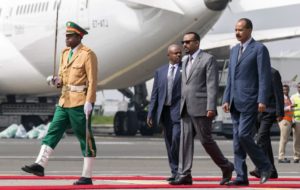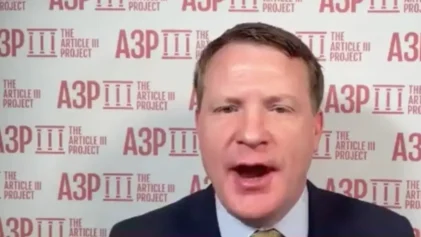
FILE – In this Saturday, July 14, 2018 file photo, Eritrea’s President Isaias Afwerki, right, is welcomed by Ethiopia’s Prime Minister Abiy Ahmed, 2nd right, for his first visit in 22 years, at the airport in Addis Ababa, Ethiopia. (AP Photo/Mulugeta Ayene, File)
ADDIS ABABA, Ethiopia (AP) — Taking the next step in their dramatic diplomatic thaw, the leaders of Ethiopia and Eritrea on Tuesday officially opened the border where a bloody war divided them for decades, with emotional residents embracing after years of separation. Ethiopia later announced that troops on both sides would withdraw.
Ethiopia’s reformist new Prime Minister Abiy Ahmed and longtime Eritrean President Isaias Afwerki “marked the radical transformation of the Ethio-Eritrea border into a frontier of peace & friendship,” Abiy’s chief of staff Fitsum Arega said in a Twitter post.
The leaders visited the Bure Front with members of their militaries to mark the Ethiopian new year and later did the same at the Serha-Zalambesa crossing, Eritrean Information Minister Yemane Meskel said on Twitter.
Photos showed Abiy in camouflage walking alongside Isaias in olive drab, while a ribbon stretched across one border post bristled with military personnel carrying not guns but cameras. Hundreds of civilians waved the countries’ flags. People of the countries’ Tigray region, who share close cultural ties, danced while flag-draped camels wandered by.
In comments carried hours later by the state-affiliated Fana Broadcasting Corporate, Abiy announced that “to ease the tense atmosphere that existed in border areas, Ethiopian Defense Forces will return to various camps to recover and obtain additional training. The same will be done on the Eritrean side. Until then, soldiers will assist local farmers and shift to development activities.”
The former bitter rivals have made a stunning reconciliation since Abiy weeks after taking office in April announced that Ethiopia would fully embrace a peace deal that ended a 1998-2000 border war that killed tens of thousands. At the time, he said the countries would celebrate the Ethiopian new year together: “We want our brothers and sisters to come here and visit us as soon as possible.”
Embassies have reopened, telephone lines have been restored and commercial flights between the capitals have resumed as some long-separated families have held tearful reunions. Landlocked Ethiopia, one of Africa’s fastest-growing economies, and Eritrea, one of the world’s most closed-off nations, also plan development cooperation around Eritrea’s Red Sea ports in particular.
Reports on social media on Monday indicated that mine-clearing activities were underway in one border area, signaling that an opening was planned. The United Nations has called the border one of the world’s most heavily mined.
Abiy on Monday told a new year’s eve concert crowd of thousands in Ethiopia’s capital, Addis Ababa, that “as of today, Ethiopian and Eritrean people will prosper together and march in unison. … The last five months have brought hope and reconciliation.”
The Ethiopian new year has roots in the Ethiopian Orthodox Church and is related to the Julian calendar. Eritrea has used the Gregorian calendar since it gained independence from Ethiopia in 1993.
The reconciliation between Ethiopia and Eritrea has been warmly welcomed by the international community and has led to a series of further thaws in the fragile Horn of Africa region, with Eritrea resuming diplomatic ties with both turbulent Somalia and the small but strategic port and military nation of Djibouti.
Observers now wonder whether the thaw will inspire Eritrea’s leader, who has led since independence without elections, to embrace reforms and loosen a strict military conscription system that has led the small country to become one of the largest sources of migrants fleeing toward Europe, Israel and elsewhere.


